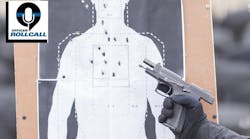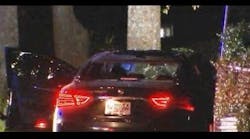After more than 15 years on the lam, former fugitive Giovanni Spiller was convicted late Tuesday of a 1996 slaying that left the victim's family shattered and exposed weaknesses in America's system for apprehending international fugitives.
FBI agents arrested the 67-year-old Spiller last year in California after a person who knew of his whereabouts read a Tribune article about the unresolved case and contacted Chicago police and the FBI.
Spiller's story is in many ways emblematic of the criminal justice breakdowns highlighted by the Tribune's "Fugitives from Justice" investigation, a series that documented how thousands of suspects have crossed a U.S. border to evade trial for murder, rape and other felony charges.
Spiller surrendered to Chicago detectives in 1996 but fled the city after posting a low bond. Three years later, he was found in the Philippines, but an extradition effort stalled in that country. Spiller eventually returned to the U.S., but the manhunt drifted for years despite clues that tied him to a property in Hemet, Calif.
The eldest son of Roberto "Bobby" Castillo, 53, whom Spiller fatally shot on Nov. 29, 1996, said he was "elated" by the conviction and hopes Spiller will spend the rest of his life in prison.
"Things are finally closing and we can truly put this horrible incident behind us. It's done and there was justice for my father," said the 38-year-old Carlo Castillo.
Spiller is the first fugitive highlighted in the Tribune series who was later convicted. Three more have been captured and await extradition from India, Mexico and Poland, and several other cases have been re-activated, according to law enforcement sources and victims' families.
"If it wasn't for you guys, none of this ever would have happened," Castillo's younger son, Roberto "Allen" Castillo, told reporters Wednesday.
Carlo Castillo said it was painful to listen during the trial as an eyewitness recounted watching Spiller shoot his father with a .45-caliber pistol outside Marie's Golden Cue, a pool hall at 3241 W. Montrose Ave., then pump three more bullets into Castillo's body as he lay on the ground.
Spiller and Castillo were longtime friends; they grew up on tough streets in different communities in the Philippines. But they had argued days earlier and Castillo severely beat Spiller, according to Castillo's family.
Spiller sprinted from the pool hall after the shooting, but at least one person on the bloodstained street identified him as the assailant, according to Tribune interviews.
About three weeks after the slaying, Spiller turned himself in to Grand Central area detectives.
Books and pamphlets about identity switching had been found in his home, inventoried by police and made available to Cook County prosecutors. The Tribune also found that Spiller had long been using at least three driver's licenses with different names and birth dates, and he was listed in law enforcement records under numerous aliases.
But Spiller's attorney convinced a judge that Spiller should be released on $200,000 bail -- meaning his wife had to put down only $20,000 cash.
About three months later, Spiller cut off his electronic monitoring device and vanished.
A cousin of Spiller's later told an FBI agent that he drove Spiller to Memphis and dropped him off at a Greyhound bus station. The man added that "Spiller called him collect from the Philippines and left a message saying that he had made it," a federal warrant said.
Chicago police gathered -- but could not confirm -- tips that Spiller was working as a bodyguard for a Filipino government official.
Three years after the slaying, in 1999, the FBI got a fix on Spiller's whereabouts in the Philippines, and the following year U.S. officials persuaded Filipino authorities to issue a provisional arrest warrant. But Filipino officials told the Americans they couldn't find Spiller at the specified address, and the case fell dormant, the Tribune found.
At some point after that, Spiller slipped back into the U.S. and moved into a two-story, tile-roofed home in Hemet, a mid-size city about 80 miles southeast of Los Angeles.
Spiller obtained identification from an incarcerated criminal stating he was "Johnny Harrington," dyed his hair, avoided family gatherings and rarely answered the telephone, according to interviews. But he also left clues to his whereabouts, the Tribune found.
Spiller was living at a Hemet house he co-owned with his wife, and the couple used that address and a Hemet bank account when paying property taxes on the Chicago house they continued to own, records show.
Spiller's wife died last year.
More than 6 feet tall and muscular in his prime, Spiller was a diminished man when he finally appeared for trial in Chicago's austere criminal courts building. "Age had set upon him. He would never make eye contact with me," Carlo Castillo said.
"To not acknowledge my presence angered me, I felt a lot of rage. He took away the time my brother, my wife and my three kids could have had with my dad."
State's Attorney Anita Alvarez told the Tribune that her office "continues to make a dedicated effort to apprehend fugitives who flee our jurisdiction, and this case serves as an example that we will never give up in our quest for justice, no matter where a defendant may try to run or hide. We are extremely pleased with this verdict and it is our hope that it will bring some measure of justice for the family of Roberto Castillo."
Spiller's attorney, Ralph Meczyk, said that Spiller will appeal his conviction, asserting that bullet wounds on Castillo's body raised questions about an eyewitness account that Spiller executed Castillo as he lay on the ground. Spiller testified at trial that he acted in self-defense, Meczyk said.
Cook County Judge James Obbish convicted Spiller in a bench trial and is set to sentence him on July 2. Under laws prevailing at the time of the 1996 murder, Spiller faces a minimum 20-year prison term, although his time could be cut in half by good behavior.
Copyright 2013 - Chicago Tribune
McClatchy-Tribune News Service


